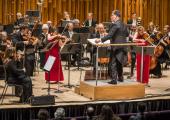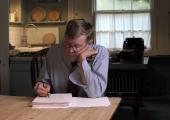The blossoming of modern classical into a serious commercial contender has been an unexpected recent development. Then again, it should come as no surprise that in a world raddled by stuff to hear and look at 24/7, people are turning to music that offers contemplative peace and quiet, that’s all about eyes-closed, non-verbal beauty. For it is the floaty, gentle, soothing styles that are taking off, not a resurgence in Wagnerian opera. The likes of Ludovico Einardi, Max Richter, Joep Beving, Nils Frahm and Jóhann Jóhannsson, often with connections to cinema, are offering rich, mostly keyboard-led sounds, carefully, unobtrusively painted with 21st-century electronic technology.
James Heather’s debut album quietly announces him as a new contender in this world, a possible future heavyweight. It’s a simple affair, just him and a piano, but like Erik Satie and Georges Auric a century ago, it doesn’t stop him using the instrument as a conduit through which to express a range of clearly felt moods. In fact, he’s more like the former than the latter, who had an inclination towards rumbustious discordance. Instead, Heather’s nine pieces have a warm approachability, riven with understated emotion. With one exception, they’re inspired by a range of global news stories connected to specific events, ranging from the Boer War to the 2015 Paris terror attacks.
They range from the catchy “Empire Sounds”, which is weighted with thoughtful poignancy, such that it induces in the listener a sense of just finishing a powerful film or boxset. “Teardrop Tattoo”, on the other hand, has a bubbling happiness, the rush of a first date gone well. It’s an album that runs the gamut, from the slow forlorn emptiness of “MHope” to the grander, more old-fashioned stylings of “Pathos” (the one piece not based on a news story).
After a few listens, the striking thing about Stories From Far Away on Piano is that it may have been conceptually sculpted out of material from around the world, but, with contradictory simplicity, it emanates a nearness to the concerns of the human heart.
Overleaf: Listen to James Heather "Last Minute Change of Heart"










